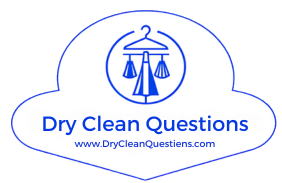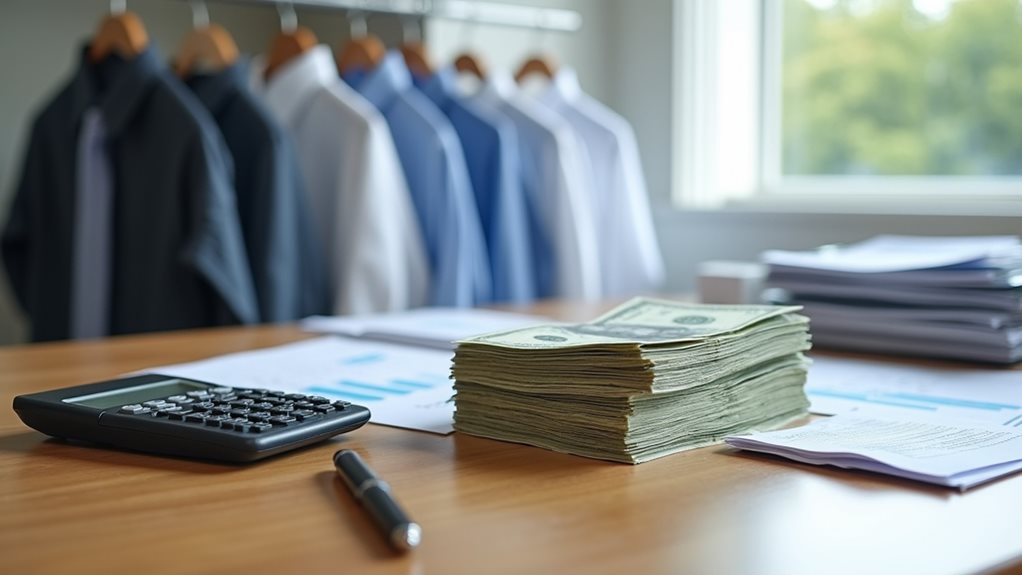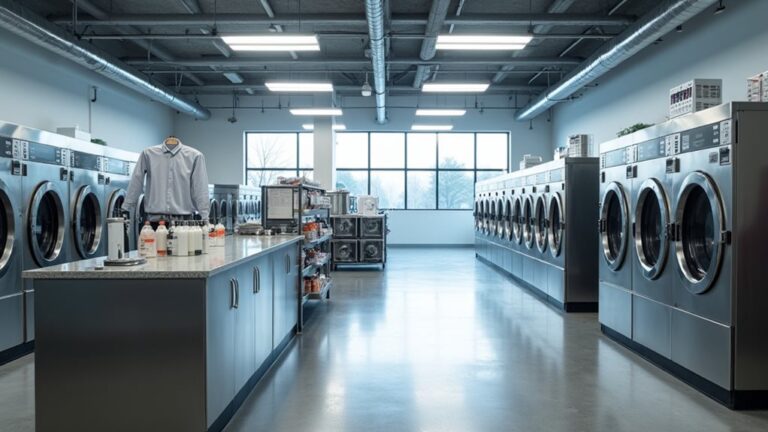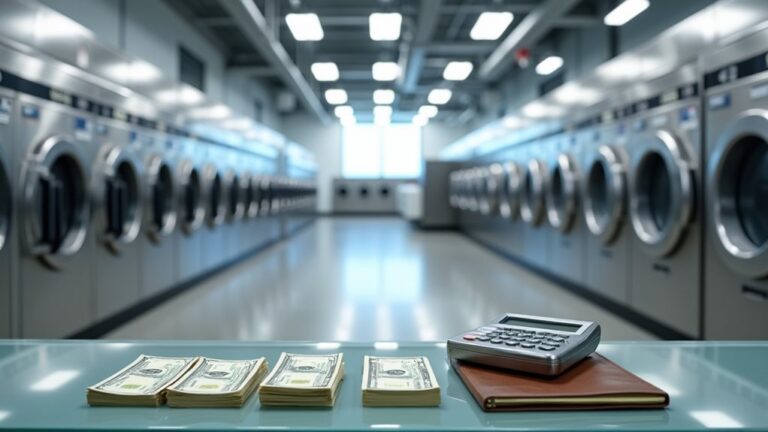Starting your dry cleaning business will require between $20,000 and $500,000, depending on whether you’re opening a full storefront or starting with a delivery service model. Your biggest expenses include dry cleaning machines ($15,000-$70,000), monthly rent ($2,500-$9,000), and skilled staff wages ($12,000-$25,000 monthly). I’ve seen smart entrepreneurs begin with drop-off locations for just $10,000-$50,000, then expand gradually. Keep exploring to discover which financing options work best for your situation.
Initial Investment Breakdown for Dry Cleaning Operations
Starting a dry cleaning business requires careful financial planning, and honestly, the investment range can feel overwhelming at first – I remember staring at those numbers thinking, “Well, that’s quite a spread!” 😅
You’re looking at anywhere from $20,000 to $500,000 in startup costs, which might seem like comparing a compact car to a luxury SUV, but the difference comes down to your business model, location choice, and how fancy you want to get with your equipment.
Your initial investment breaks down into several key areas that’ll determine your path to financial stability.
Equipment costs alone can range from $15,000 for basic cleaning machines to over $70,000 for high-quality dry cleaning systems. Monthly commercial property expenses, including rent and utilities, typically run $2,500 to $9,000.
Don’t forget marketing expenses and that essential emergency fund covering operating expenses.
You’ll also need to budget for licensing and permits, which typically cost between $2,000 and $10,000 depending on your local regulations and business structure.
Equipment Costs and Commercial Property Expenses
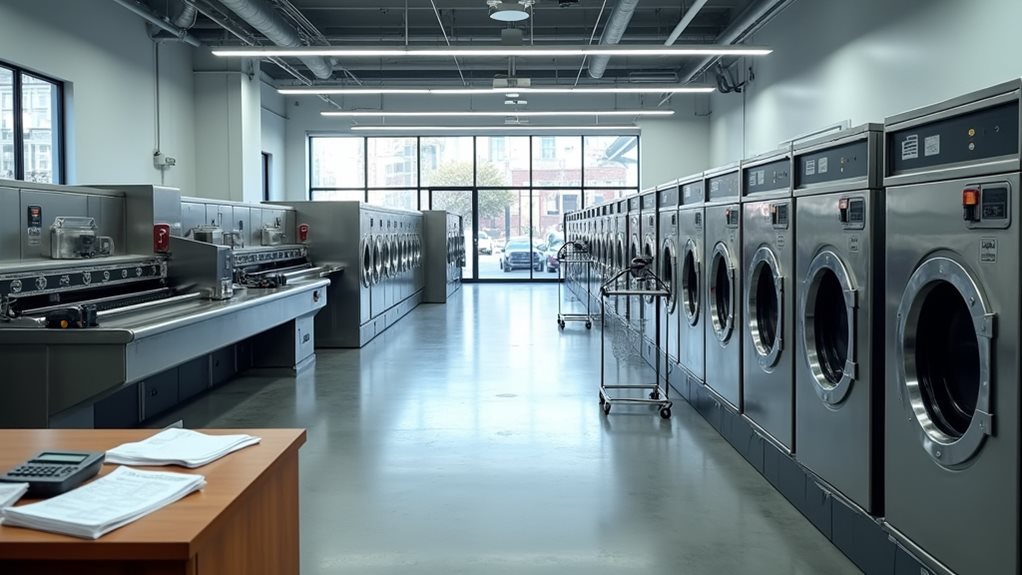
When I first considered opening my dry cleaning business, I honestly underestimated how much the equipment and property costs would impact my startup budget, thinking I could get by with basic machines until reality hit me with a $45,000 equipment bill.
You’ll need to carefully plan your vital equipment investment breakdown, because those dry cleaning machines, pressing equipment, and laundry units can range from a modest $15,000 to a hefty $70,000 depending on whether you choose basic or high-end options.
Your monthly property cost planning becomes equally important since you’re looking at $2,500 to $9,000 in rent alone, plus those sneaky renovation costs that can easily eat up 10-15% of your total investment if you’re not careful.
Remember that urban locations typically command higher rent prices but also offer better profit potential due to increased customer density and higher income demographics in these areas.
Essential Equipment Investment Breakdown
Before you can welcome your first customer through the door, you’ll need to understand that equipment and property expenses represent the largest chunk of your startup investment, often accounting for 60-70% of your total budget.
Your crucial equipment investment breakdown starts with dry cleaning machines ($15,000-$70,000), pressing equipment ($3,000-$8,000), and laundry machines ($2,000-$10,000) 💰.
Don’t forget the smaller necessities: conveyor systems ($1,000-$5,000) and point-of-sale (POS) systems ($1,000-$3,000).
Commercial property expenses add another layer, with monthly rent between $2,500-$9,000, plus those sneaky initial costs like security deposits.
Here’s what caught me off-guard: renovation and setup costs tack on an additional 10-15% of your property investment for infrastructure upgrades.
Franchise opportunities may require additional upfront fees but often provide established business models and ongoing support that can help reduce some of the risks associated with equipment selection and property setup.
Monthly Property Cost Planning
Understanding those upfront equipment costs is just half the battle—now you need to map out the monthly expenses that’ll keep your doors open and your machines humming.
Monthly commercial property costs will likely become your biggest operational headache, ranging from $2,500 to $9,000 depending on your location and space requirements.
Don’t forget utilities like water, gas, and electricity—trust me, commercial cleaning equipment drinks power like a thirsty teenager 😅.
Property insurance premiums add another layer to your monthly expenses, especially given the unique risks of dry cleaning operations.
These ongoing expenses greatly impact your financial projections, so factor in potential infrastructure upgrades for plumbing and electrical work.
Your startup costs extend beyond equipment into these recurring operational expenses that’ll define your business’s sustainability.
You’ll also face recurring costs for purchasing and safely disposing of cleaning solvents like perchloroethylene, which requires specialized handling and compliance with environmental regulations.
Business Model Options and Their Financial Requirements
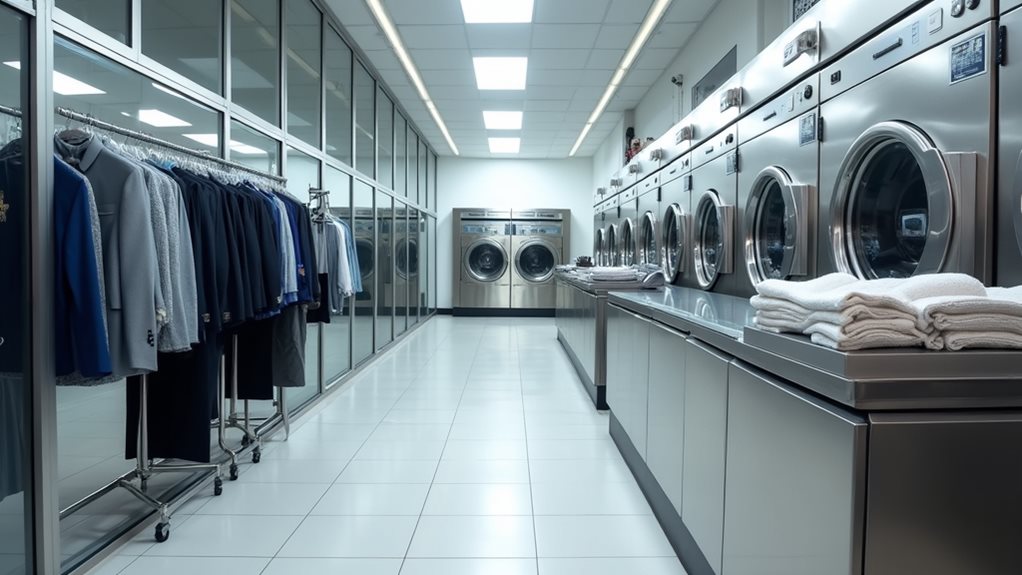
Three distinct business models dominate the dry cleaning industry, and each one comes with its own financial personality that’ll either make your wallet smile or cry a little.
Your traditional storefront represents the heavyweight champion of initial investment, demanding anywhere from $20,000 to $500,000 depending on your location’s appetite for commercial property costs and equipment costs.
Drop locations offer a gentler financial introduction, typically requiring $10,000 to $50,000 since you’re complementing existing businesses without the full storefront commitment.
The delivery service model becomes your scrappy underdog option, needing less than $50,000 for vehicle and branding expenses.
Franchise opportunities may reduce some startup risks through training support and established systems, but they come with franchise fees and ongoing royalties that independent operators can avoid.
Each business model option shapes your service offerings differently, so choose the financial requirements that match your comfort zone and long-term dry cleaning business vision.
Licensing, Insurance, and Legal Compliance Costs
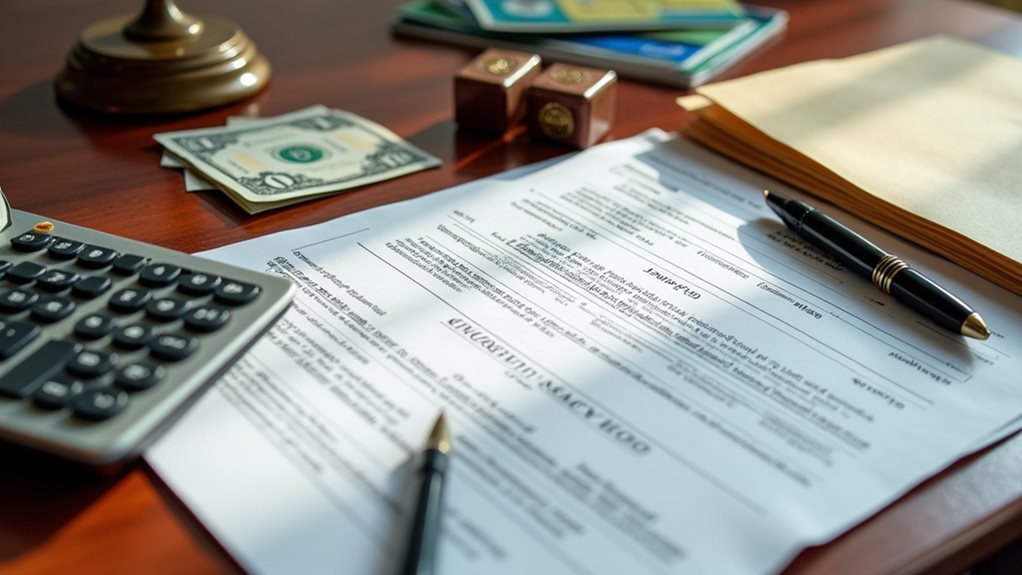
You’ll need to maneuver through the maze of licensing requirements, which can feel like trying to solve a Rubik’s cube blindfolded since costs swing wildly from $100 in some states to several thousand in others, especially if you’re setting up shop in places like New York where environmental permits add extra layers.
Your insurance portfolio becomes your safety net, requiring general liability coverage ($500-$3,000 annually) and workers’ compensation ($1,500-$3,000 per employee yearly), because trust me, you don’t want to learn about workplace accidents the hard way.
Environmental compliance might push you toward legal counsel at $200-$500 per hour, which initially made me wince at the expense until I realized one misstep with chemical regulations could cost far more than a lawyer’s retainer 😅.
These environmental regulations are particularly crucial since traditional dry cleaning uses perchloroethylene (PERC), a chemical solvent that requires careful handling and disposal to meet safety standards.
Required Business Licenses
Before you can hang your first “Open” sign, securing the proper business licenses and insurance coverage will become one of your most critical early investments, though the costs can feel like maneuvering through a maze blindfolded.
As a future dry cleaning business owner, you’ll discover that required business licenses vary dramatically depending on your location, creating costs associated with startup that range from manageable to eye-watering.
Here’s what you’re looking at financially:
- Business licenses and permits: $100-$1,000+ depending on state regulations and environmental compliance requirements
- General liability insurance: $500-$2,000 annually to protect against customer accidents
- Workers compensation: $1,000-$3,000 yearly for employee protection
Legal fees for traversing these requirements typically run $200-$400 per hour, adding considerable startup costs to your business operations before you’ve even processed your first shirt! 😅
Additionally, you’ll need to secure environmental permits specifically for handling the chemical solvents used in dry cleaning processes, which can add another layer of regulatory compliance costs to your startup budget.
Insurance Coverage Types
Four essential insurance coverage types will become your financial safety net in the dry cleaning industry, and honestly, skipping any of them feels like driving blindfolded on a highway during rush hour.
General liability insurance protects against accidents and lawsuits, costing you $500 to $3,000 annually—think customers slipping on wet floors or chemical reactions.
Workers’ compensation insurance covers employee injuries and runs $0.75 to $2.74 per $100 of payroll, which most states require anyway.
Property insurance shields your equipment and building from disasters, while environmental compliance coverage handles chemical-related incidents.
In Nigeria specifically, business registration and permit costs typically range from ₦50,000 to ₦150,000 as part of your legal compliance requirements.
These legal compliance costs, combined with your laundry/dry-cleaning license application fees, create a thorough protection system that’ll save you thousands during business setup headaches.
Environmental Regulation Compliance
While most entrepreneurs worry about customer acquisition and profit margins, environmental regulation compliance sneaks up like that friend who always shows up unannounced—except this friend carries hefty fines and shutdown orders if you’re not prepared.
Your environmental regulation compliance process involves several important steps:
- Permits and licenses: You’ll need specialized environmental permits costing $200-$1,500, plus laundry licensing requiring proof of ownership and $150-$500 for the application process.
- Chemical declarations: State environmental regulations demand you declare all cleaning solvents, adding administrative costs to your startup budget.
- Insurance protection: General liability insurance ($500-$2,000 annually) and workers’ compensation insurance ($1,000-$3,000) become vital annual operating costs.
Traditional dry cleaning operations using perchloroethylene (PERC) face additional scrutiny due to health and environmental concerns, which may require more stringent compliance measures and higher insurance premiums.
Think of compliance as investing in your business’s longevity—it’s cheaper than explaining to regulators why you skipped the paperwork!
Staffing Expenses and Operational Budget Planning
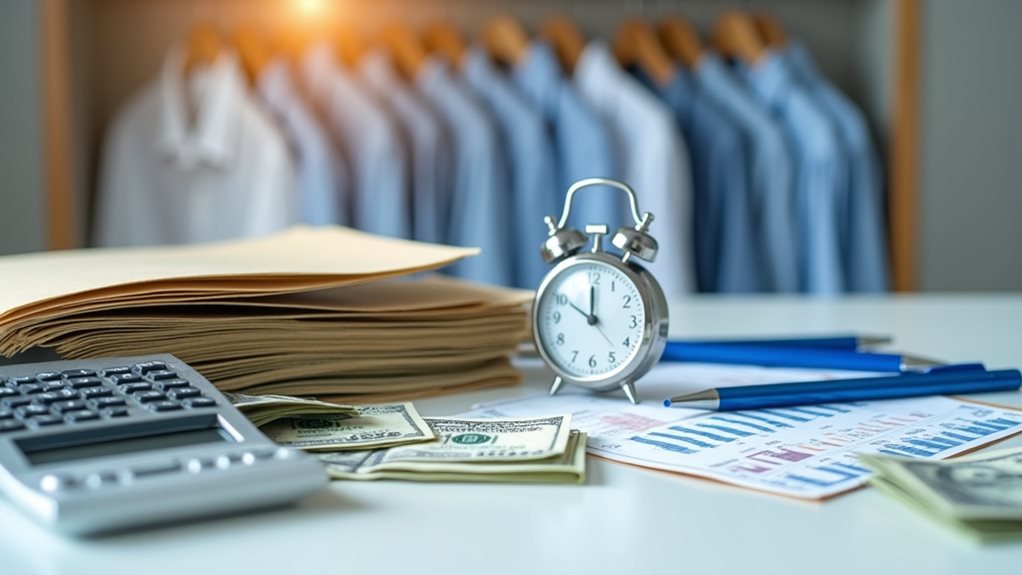
Once you’ve figured out your equipment and location costs, the reality of staffing expenses will hit you like a splash of cold cleaning solvent – and trust me, I learned this the hard way when I underestimated my first month’s payroll by nearly $8,000.
Your operational budget needs to account for skilled staff like experienced dry cleaners, customer service representatives, and garment handling assistants, which typically runs $12,000 to $25,000 monthly.
Staffing costs for skilled dry cleaning employees will demand $12,000-$25,000 monthly from your operational budget.
Don’t forget that employee compensation must align with your financial goals while covering ongoing expenses like utilities and equipment maintenance.
Here’s my hard-earned wisdom: establish an emergency fund covering 3-6 months of operating expenses ($15,000-$75,000) because payroll waits for no one, especially during those inevitable slow seasons that’ll test your resolve.
Beyond staffing, remember that recurring revenue from busy professionals and families creates a reliable customer base that can help stabilize your monthly cash flow projections.
Financing Options and Capital Requirements
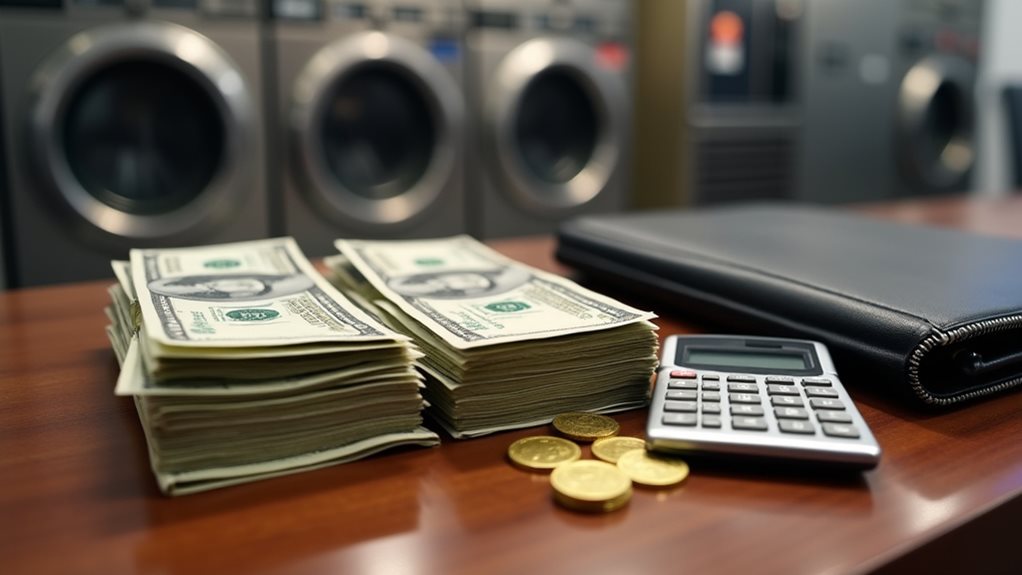
Now that you understand the ongoing financial commitments you’ll face, let’s talk about where all that money actually comes from – because unless you’ve got a secret trust fund hiding somewhere (and if you do, please share your secrets! 😉), you’ll need to explore various financing routes to transform your dry cleaning dreams into reality.
Your initial investment typically ranges from $20,000 to $500,000, depending on your chosen model and location.
Here’s where that capital requirements money can come from:
- Personal savings combined with small business loans from traditional banks
- SBA-backed loans offering favorable terms for qualified entrepreneurs
- Equipment financing specifically covering those $10,000-$70,000 machine costs
